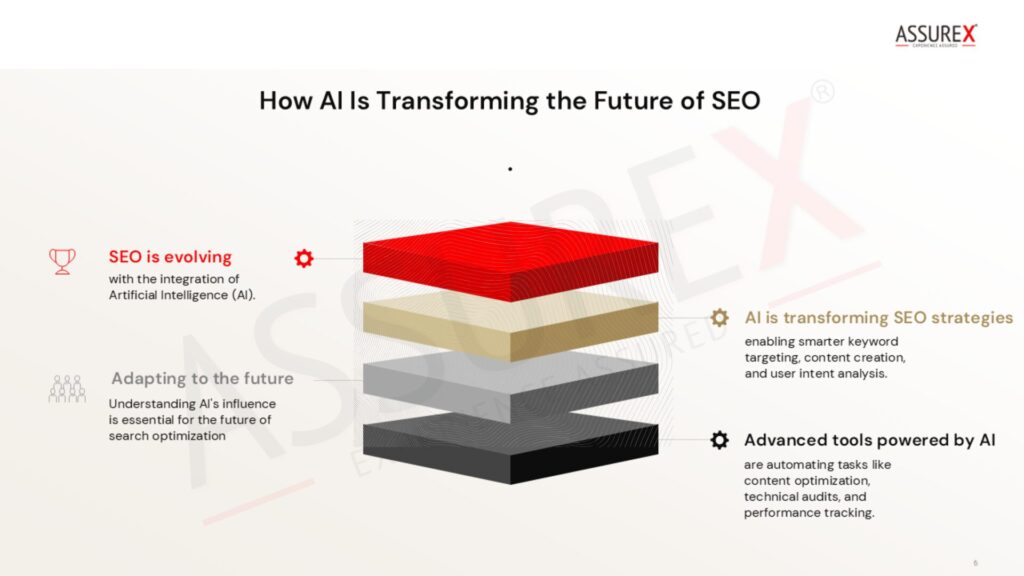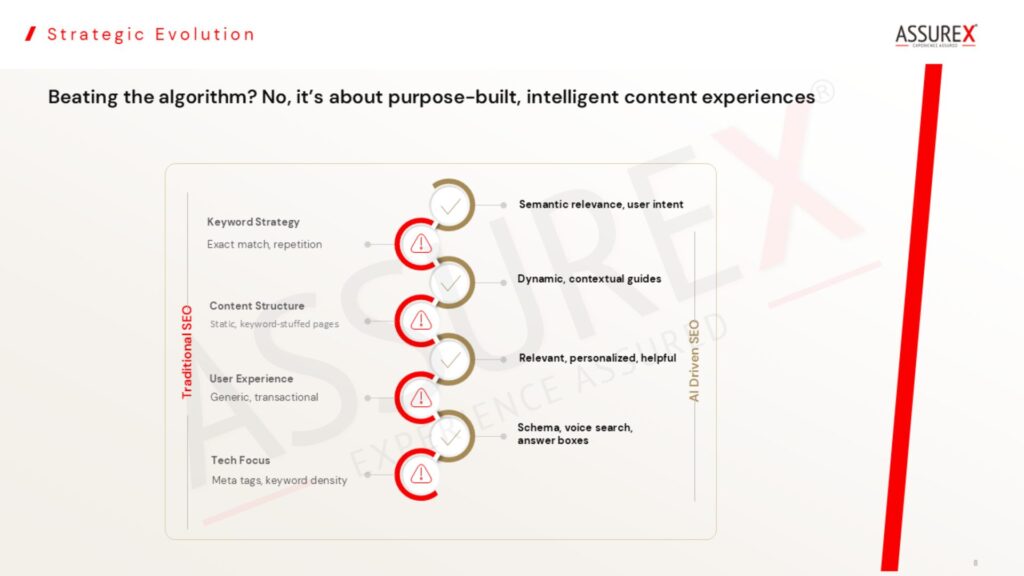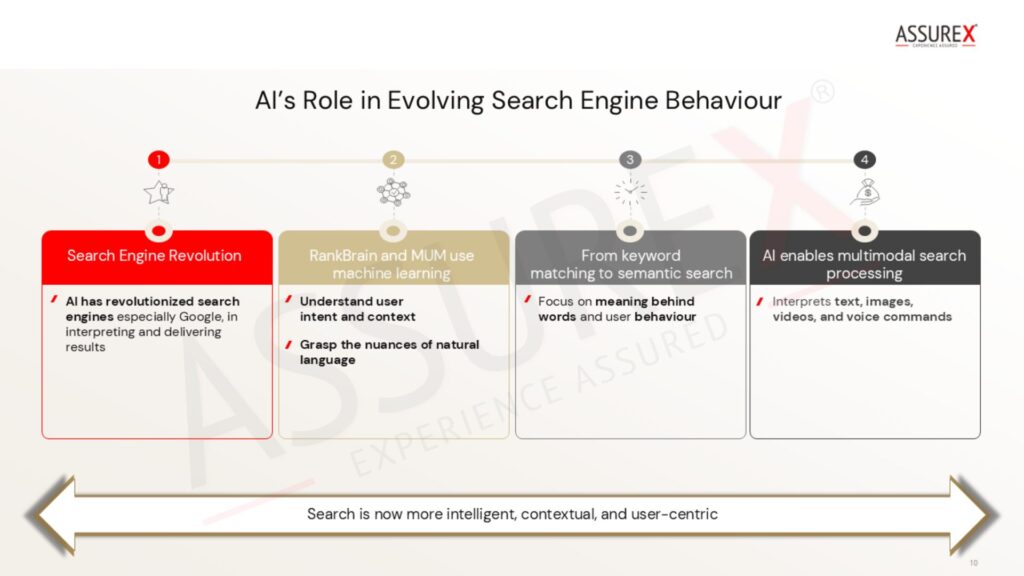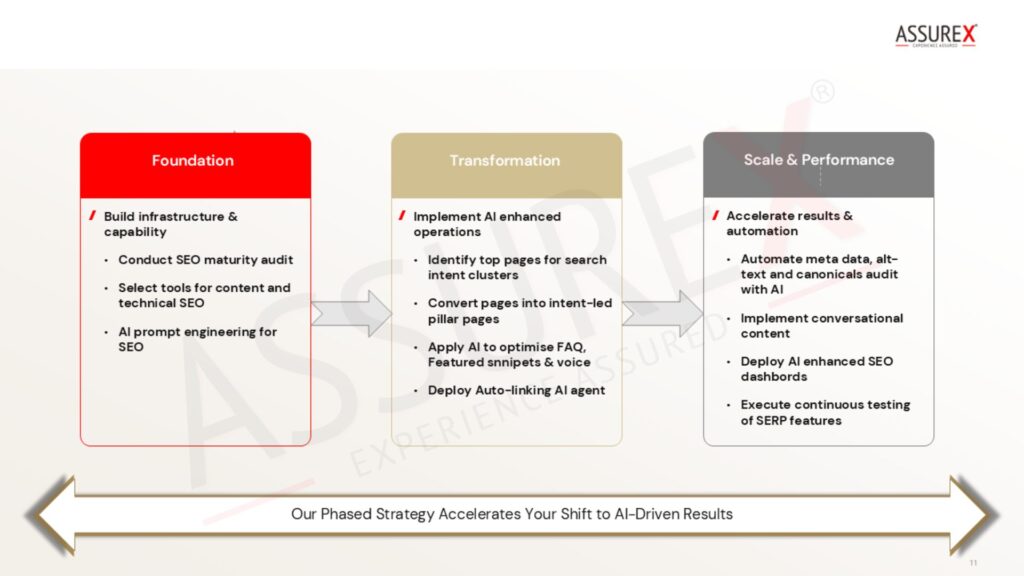Search Engine Optimization (SEO) is undergoing a profound transformation, fueled by the rapid advancement of Artificial Intelligence (AI). As AI reshapes the digital landscape, it’s redefining how we approach SEO—from keyword strategies and content creation to user experience and personalization. For marketers and businesses, understanding this shift is critical to staying competitive.
Today’s users demand faster, more accurate, and context-aware search results. AI-powered search engines are rising to meet these expectations by interpreting intent more intelligently, delivering personalized experiences, and supporting multimodal queries like voice and image. This evolution calls for a new SEO mindset—one that aligns with how modern users interact with search platforms.

From Keywords to Intent: How SEO is evolving in the era of AI?
Traditional SEO focused heavily on keyword matching, often resulting in repetitive, fragmented content. The primary objective was to align with search engine algorithms—prioritizing exact-match keywords, meta tags, and keyword density—rather than delivering meaningful value to users. This approach often led to content that was technically optimized but lacked depth, relevance, and engagement. Pages were created to rank, not to resonate.
But AI has changed the game. With advancements in natural language processing and machine learning, SEO is shifting toward understanding user intent, context, and behavior. AI enables search engines to interpret the meaning behind queries, not just the words used, allowing for more nuanced and personalized results. As a result, content strategies must now focus on delivering real value, answering complex questions, and creating seamless user experiences.
🔁 Traditional SEO
- Relied on exact-match keyword strategies.
- Prioritized search engine rules over user relevance.
- Produced static, keyword-stuffed pages.
- Focused on meta tags and keyword density.
🚀 AI-Powered SEO
- Understands user intent across diverse search journeys.
- Creates adaptive, context-aware content.
- Supports semantic relevance and multimodal search (e.g., voice, image).
- Enhances user experience with personalized, helpful content.

What role does AI play in evolution of Search Engines?
AI is not just transforming SEO practices—it’s also revolutionizing how search engines themselves operate. Modern search engines, led by innovations like Google’s RankBrain and MUM, now leverage machine learning to understand the nuances of human language, context, and intent. This shift marks a departure from traditional keyword-based indexing toward a more semantic, user-centric model. AI enables search engines to process and interpret a wide range of inputs—including voice, images, and video—making search more intuitive and multimodal. As a result, the algorithms are no longer just matching terms; they’re predicting needs, understanding sentiment, and delivering results that align more closely with user expectations and behaviors.
🔍 Smarter Search Engines
- Google’s RankBrain and MUM use machine learning to interpret user intent and natural language.
- Semantic search now focuses on the meaning behind queries, not just the words.
- Multimodal search allows engines to process text, images, videos, and voice commands simultaneously.
This shift means SEO strategies must now align with how AI interprets and delivers search results.

How to Transform SEO Strategy with AI?
To effectively transform your SEO strategy with AI, start by evaluating your current SEO maturity and building a solid foundation with the right tools and infrastructure. Incorporate AI technologies to automate and enhance key tasks such as content clustering by search intent, converting static pages into dynamic pillar content, and optimizing for rich results like featured snippets and voice search.
AI can also streamline internal linking, metadata generation, and technical audits, significantly improving efficiency and accuracy. As you scale, leverage AI dashboards for real-time insights, automate routine SEO tasks, and continuously test and refine your approach to align with evolving user behavior and search engine algorithms—ensuring your strategy remains adaptive, intelligent, and performance-driven.
Transforming your SEO strategy with AI involves three key phases: Foundation, where you assess and equip; Transformation, where AI enhances content and operations; and Scale, where automation and continuous optimization drive performance. This phased approach ensures your SEO remains intelligent, adaptive, and aligned with evolving search behavior.
🧱 1. Foundation
- Conduct an SEO maturity audit.
- Build infrastructure and select AI-powered tools.
- Develop prompt engineering skills for SEO applications.
🔧 2. Transformation
- Implement AI-enhanced operations.
- Identify top-performing pages and group them by search intent.
- Convert content into intent-led pillar pages.
- Optimize FAQs, featured snippets, and voice search using AI.
- Deploy auto-linking AI agents.
📈 3. Scale & Performance
- Automate metadata, alt-text, and canonical audits.
- Use AI to generate conversational content.
- Launch AI-enhanced SEO dashboards.
- Continuously test and refine SERP features.

Conclusion: The Future Is Intelligent
AI is not just a tool—it’s a catalyst for a smarter, more strategic approach to SEO. By embracing AI-driven insights and automation, businesses can create meaningful, user-focused content that aligns with how modern search engines operate. The future of SEO is intelligent, adaptive, and deeply connected to understanding human intent.
For more insights or to discuss how AI can elevate your SEO strategy, contact Assurex
